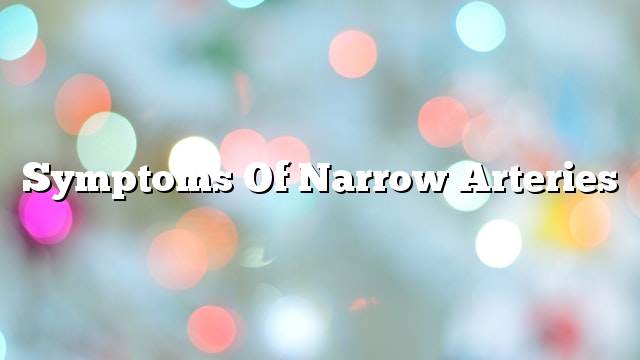Narrow arteries
The narrowing of the artery results from a narrowing of the inner muscles of the arteries of the heart. As a result of narrowing of the artery, blood can not pass through the blood vessels. The heart does not receive oxygenated blood. The narrowing of arteries is usually temporary or short, but it can cause several complications For the future heart.
Symptoms of narrow arteries
In most cases, there are no signs of narrowing of the arteries, but sometimes there are many symptoms, such as:
- Pain in the chest at intervals may sometimes reach the jaw, neck and arms, this pain is known as angina.
- Feeling tight in the chest, and a sense of constriction inside.
- Pain in the left side of the chest.
- There is a difference in the measurement of blood pressure between lower leg pressure, and forearm pressure of the upper limb.
- Note: When you experience pain in the chest during rest, which usually occurs in the early morning or night for between five minutes and thirty minutes, you should see your doctor and undergo the examination.
Causes of narrow arteries
- Sleeping after eating and filling the stomach; where the heart muscle is strained, causing a heart attack.
- High blood pressure, as it increases the risk of narrowing arteries and stiffening.
- High cholesterol in the blood.
- Do not exercise.
- High calcium deposits in the blood, which result from eating fatty foods in excessive quantities that contain animal fats such as: cream, municipal ghee, and butter.
- Smoking is one of the leading causes of arteriosclerosis.
- Excess weight, and exposure to persistent mental stress.
- Nervousness, tension, and constant anxiety.
- Genetic factor, and diabetes.
Risk factors for narrowing the arteries
- Exposure to high temperature, to a very low temperature.
- Fatigue and stress.
- Drink alcohol.
- Smoking, and drug abuse.
- Many drugs, especially doping.
Complications of narrow arteries
- Arrhythmias, meaning slow heartbeat or increased heart rate.
- Heart stroke, and cardiac arrest.
- sudden death.
- Weakness in the functions or vitality of different body organs such as: weakness in vision, or in movement, or in higher brain functions as memory impairment.
Treatment of narrow arteries
- Nitrates help to relax the walls of the arteries, and dilate the blood vessels.
- Food supplements to prevent narrowing of the arteries.
- Calcium channel blockers that relieve chest tightness.
Diagnosis of narrow arteries
The narrowing of the arteries is diagnosed through numerous tests such as: ultrasound, ECG, CT scan, and MRI. This examination is one of the safest, fastest and most accurate screening methods.
